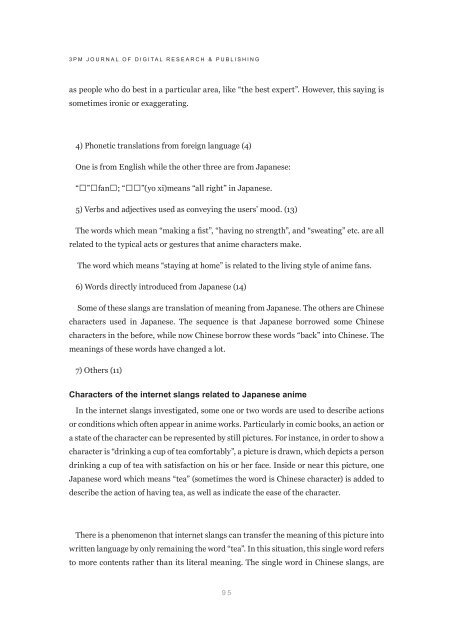3pm Journal of Digital research & publishing - artichoke web design
3pm Journal of Digital research & publishing - artichoke web design
3pm Journal of Digital research & publishing - artichoke web design
Create successful ePaper yourself
Turn your PDF publications into a flip-book with our unique Google optimized e-Paper software.
<strong>3pm</strong> <strong>Journal</strong> <strong>of</strong> <strong>Digital</strong> <strong>research</strong> & <strong>publishing</strong><br />
as people who do best in a particular area, like “the best expert”. However, this saying is<br />
sometimes ironic or exaggerating.<br />
4) Phonetic translations from foreign language (4)<br />
One is from English while the other three are from Japanese:<br />
“�”�fan�; “��”(yo xi)means “all right” in Japanese.<br />
5) Verbs and adjectives used as conveying the users’ mood. (13)<br />
The words which mean “making a fist”, “having no strength”, and “sweating” etc. are all<br />
related to the typical acts or gestures that anime characters make.<br />
The word which means “staying at home” is related to the living style <strong>of</strong> anime fans.<br />
6) Words directly introduced from Japanese (14)<br />
Some <strong>of</strong> these slangs are translation <strong>of</strong> meaning from Japanese. The others are Chinese<br />
characters used in Japanese. The sequence is that Japanese borrowed some Chinese<br />
characters in the before, while now Chinese borrow these words “back” into Chinese. The<br />
meanings <strong>of</strong> these words have changed a lot.<br />
7) Others (11)<br />
Characters <strong>of</strong> the internet slangs related to Japanese anime<br />
In the internet slangs investigated, some one or two words are used to describe actions<br />
or conditions which <strong>of</strong>ten appear in anime works. Particularly in comic books, an action or<br />
a state <strong>of</strong> the character can be represented by still pictures. For instance, in order to show a<br />
character is “drinking a cup <strong>of</strong> tea comfortably”, a picture is drawn, which depicts a person<br />
drinking a cup <strong>of</strong> tea with satisfaction on his or her face. Inside or near this picture, one<br />
Japanese word which means “tea” (sometimes the word is Chinese character) is added to<br />
describe the action <strong>of</strong> having tea, as well as indicate the ease <strong>of</strong> the character.<br />
There is a phenomenon that internet slangs can transfer the meaning <strong>of</strong> this picture into<br />
written language by only remaining the word “tea”. In this situation, this single word refers<br />
to more contents rather than its literal meaning. The single word in Chinese slangs, are<br />
95


